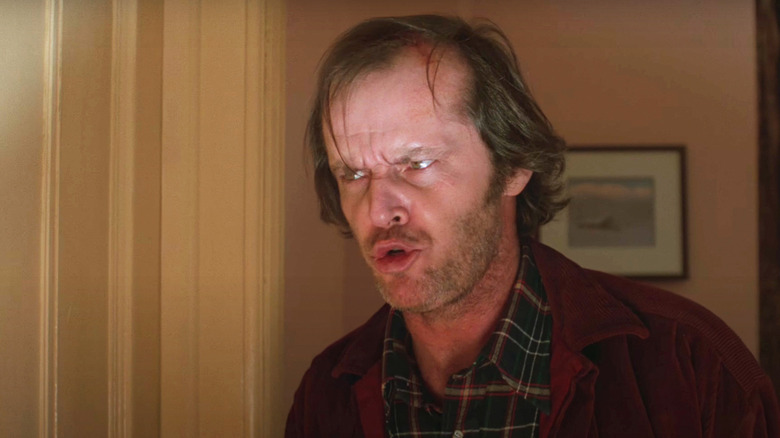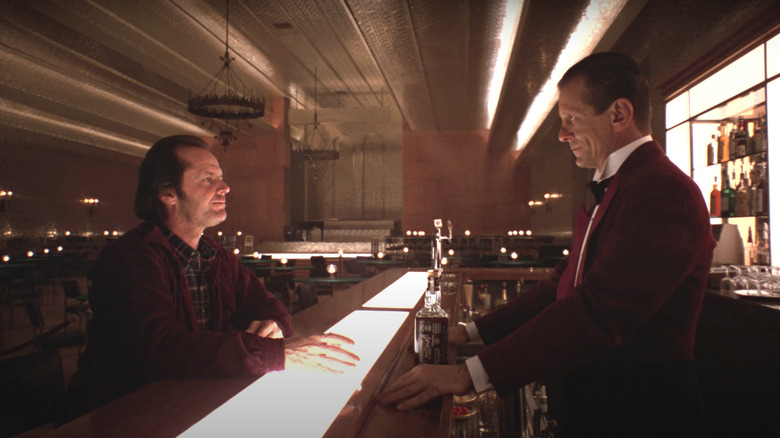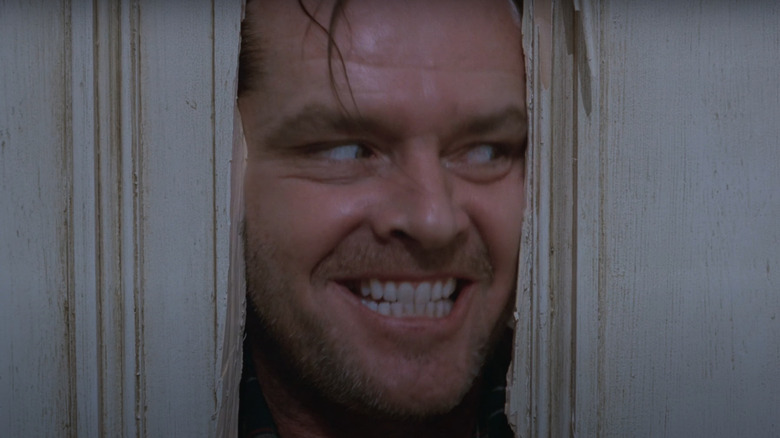Working With Stanley Kubrick On The Shining Challenged Jack Nicholson's Acting Philosophy
Jack Nicholson isn't around much these days. Content to let the age of the superhero blockbuster play out without him, the celebrated actor has retreated from the spotlight for the last decade. But prior to that, he built an enviable career that elevated him to legendary status in Hollywood. And while he naturally commands a sense of respect and awe for his prolific career, the three-time Oscar winner has tried his best to stay committed to the work and play down being treated like "Medusa or the Lincoln Memorial" when on set.
In fact, Nicholson has always been a highly intelligent and capable actor, studying his craft with the eagerness of what the New York Times called an "excitable acting-theory enthusiast who is capable of great earnestness on the subject." Back in his younger years, the actor would even "devotedly go from acting teacher to acting teacher seeking truth the way others of his generation would go from guru to guru."
By the time he came to shoot "The Shining” in 1978, the "One Flew Over The Cuckoo's Nest" star had already soaked up enough philosophy to be truly educated on the topic. That is to say, he was aware of the limits of his own knowledge. Most of the shooting took place at the EMI-Elstree Studios in Hertfordshire, England, with Nicholson staying at the Dorchester Hotel in London before moving to a four-bedroom mansion on the Thames as shooting went on. But as big a star as Nicholson was at the time, the film's director Stanley Kubrick arguably had him beat in terms of the respect he commanded. Another devoted artist who had studied his own craft closely, Kubrick would ultimately have a profound impact on Nicholson when the two worked together and their philosophies came into close contact.
Actor vs. director
The truth is, Nicholson doesn't have one acting philosophy and never did. His philosophy was actually multiple different philosophies picked up over years of reading about, discussing, and practicing his craft. From Strasberg to Stanislavski, Nicholson knew his stuff but he was more than ready to adapt his approach when working with the great Kubrick.
During Vivian Kubrick's making-of documentary (now infamous for showcasing the emotional abuse endured by Shelley Duvall at the hands of her director), Nicholson was open about his willingness to be "out of control as an actor." More specifically, the then 41-year-old said:
"When I come up against a director who has a concept that, maybe I don't agree with it [...] I'd be more prone to go with them than my own, because I want to be out of control as an actor. I want them to have the control. Otherwise it's going to become predictably my work. And that's not fun."
Demonstrating surprising wisdom, Nicholson went on to acknowledge that actors shouldn't have "one set of theories," adding, "You can go for years saying, 'I'm gonna get this thing real, because they really haven't seen it real' [...] and then you come up against someone like Stanley who says, 'Yeah it's real, but it's not interesting.'"
Nicholson's wisdom
In Ron Rosenbaum's New York Times piece, he recalls Kubrick saying that Jack Nicholson brought to a role "the one unactable quality — great intelligence." But I think the actor went beyond that, demonstrating a real wisdom that combined his intelligence with a sense of the core absurdity and futility of life. His enthusiastic performances gave him a superficial quality of being a more spontaneous, physical performer as evidenced by a scene in the making-of documentary where he psyches himself up to burst through the bathroom door in the famous "Here's Johnny" scene. But he was clearly much more cerebral than he's given credit for.
Part of the reason his career endured for the multiple decades it did was due to the fact that Nicholson wasn't simply a physical performer. His philosophies on acting guided him through one of the most successful runs in Hollywood history, and his ability to adapt those philosophies when he came up against resistance, as was the case with Kubrick, no doubt helped extend that legendary run. Even if it did mean he had to endure 60-take scenes.


